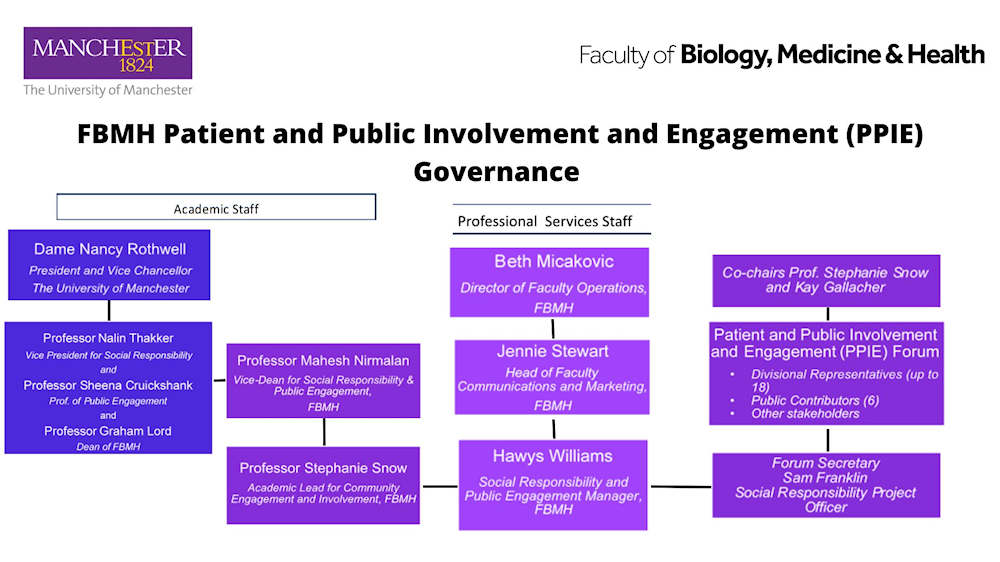
Faculty Patient and Public Involvement and Engagement Standards
High quality Patient and Public Involvement and Engagement (PPIE) is integral to achieving excellence in the University’s third goal, Social Responsibility, through embedding PPIE in the Faculty’s research and teaching.
Successful Faculty grants (e.g. NIHR Biomedical Research Centre, Wellcome Trust and the Heritage Lottery Fund) have all had strong PPIE embedded within them through involving and engaging with patients and the public (‘Public Contributors’).
It is critical that we involve and engage the public to the highest possible standards. To this end, the Faculty’s PPIE Forum has drafted the following aspirational standards which will be supported through the Forum’s action plan.
For resources to support you in your PPIE, please visit the PPIE guidance documents and templates page.
The Faculty’s PPIE (aspirational) Standards
(These have been adapted from NIHR UK Standards for Public Involvement)
- Inclusive opportunities: All members of the public to have equal access to be involved in our research and teaching. Regardless of gender identity, disability, ethnic origin, religion or belief, sexual orientation, marital or transgender status, age, or nationality. Promote your involvement opportunity via the Faculty’s Public Engagement monthly newsletter by emailing srbmh@manchester.ac.uk.
- Respectful relationships: Work together to create and sustain respectful relationships for effective co-production. Including creating a safe and accessible environment (university campus, online meeting or in the local community).
- Communications: Provide clear and accessible communications and set clear expectations from the outset as to the frequency and format of how the Public Contributor will receive communications. Bare minimum to communicate what is happening with the project at the start, middle and end of the project including the outcome.
- Feedback: Encourage Public Contributors to feed back to us and always feed back to them - ensuring that we explain the reasons why we may not be able to take action on feedback given. Feedback should be in an accessible format and in multiple formats e.g. survey, in person, email etc. It should be continuous process and not just at the end of a project.
- Take action: Recognise the views and encourage discussion from our Public Contributors, ensuring that these comments are valued and acted upon where possible. Explanation to be given as to the reasons why we may not be able to take action.
- Impact: Assess, report and act on the impact that PPIE has had on our research and teaching where possible. Share best practice across the Faculty and externally. Access public engagement evaluation resources.
- Support and learning: Provide everyone (staff, students and Public Contributors) with the necessary support to undertake PPIE with confidence and competence. Support includes; training and mentoring, policies, practices, governance, etc. Find out more about training available.
- Raise PPIE profile: Encourage everyone to recognise and promote the value of PPIE. Share PPIE activities internally and externally via blogs, publications, Faculty news items etc. Highlighting contributions from Public Contributor and the impact. Find out how you can promote your PPIE.
- Problem solving and resolution: If things don’t go to plan or as well as we would like, we will ensure that we provide the necessary support to all of those affected to enable a full resolution. Lessons are learnt from different perspectives and actions taken where possible e.g. policies to be created, training to be had, etc. If you require advice or guidance please contact the Social Responsibility and Public Engagement Team.
- Financial reimbursement: Ensure that Public Contributors are financially reimbursed for their time, skills and travel where possible. If financially reimbursement cannot be provided, justification must be given prior to their involvement. Access the Faculty’s fees and payments guidance.
[Original version created in 2016 and refreshed in 2022. Staff, students and Public Contributors were consulted at the PPIE Forum, Community Engagement Open Meetings and Inclusivity and Intersectionality event.]
Governance
The Faculty has a duty to conduct PPIE in an open, accountable, and honest and way, following the seven principles of Public Life. PPIE governance ensures that we achieve our aims of involving and engaging with the public in an ethical, effective and efficient way. PPIE is governed in the Faculty by the Faculty Leadership Team and by the University's Social Responsibility and Civic Engagement Group.
The Faculty’s PPIE Forum provides strategic direction for PPIE across the Faculty and is co-chaired by Professor Stephanie Snow and Kay Gallacher, Public Contributor. Find out more about the Forum.

View this Governance Chart as a PowerPoint document.
